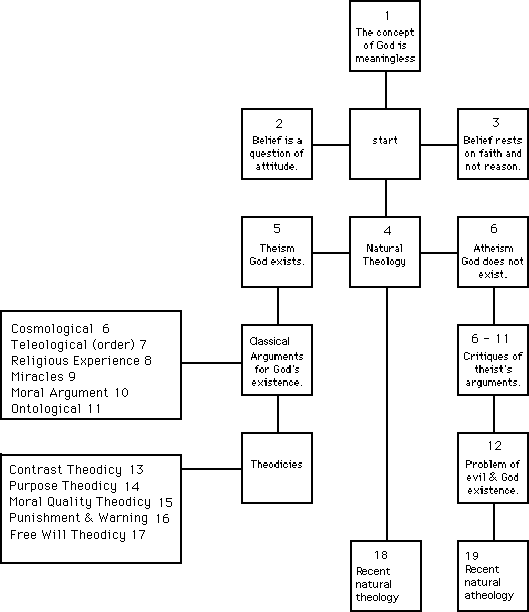
[World | Home | Peacegames | Philosophy | Catalog | Site | Order]
These materials are printed inThe Philosophy Guidebook: Complete with Maps copyright 1997 by David Felder and available for $10.
Philosophy of Religion
Does God exist?
Challenge: God does/ does not exist.

Positions and Definitions
01. Concept of God is meaningless. On this view questions are true/false or meaningless. If there is no way to verify or falsify a claim, to prove by observation that a statement is true or false, then it is meaningless. The principle of Verificationism is that a statement is verifiable if it is possible, in principle even if not in fact, to show that it is true or that it is false and that if a proposition cannot be verified it is meaningless.
02. Belief is a question of attitude. On this view when we say that "God exists" or that "God does not exist" we are not making any claims of fact but are instead expressing something else, perhaps a relationship or emotion.
03. Belief rests on faith and not reason. Belief is not related to proofs of God's existence but instead must be attained by faith. Those who hold this view do not believe that natural theology is worthwhile enterprise.
04. Natural Theology. Theology is the study related to God and natural theology is the study that examines the reasonableness of belief in God. In natural theology attempts are made to prove that God exists.
05. Theism. Theism is the belief in the existence of God.
06. Cosmological Argument. An argument that attempts to prove that God's existence follows from the fact that things exists.
07. Teleological Argument. An argument that for God's existence based on the belief that the world appears to have a purpose and to have been designed.
08. Religious Experience. An experience that a person has that makes them believe that they have had an encounter with God.
09. Miracles. An occurrence that cannot be accounted for with natural explanations that is believed to demonstrate the existence of a supernatural entity.
10. Moral Argument. An argument for the existence of God based on the claim that people need to believe in God to have a basis for moral behavior.
11. Ontological Argument. Ontology means the study of being, and an ontological argument is one that claims that if we understand the concept of God we understand that God must exist. Ontological arguments for the existence of God are based on the definition of the concept God.
12. Problem of Evil. One statement of this problem is that if God is all good and all powerful then God would not allow evil to exist. But evil does exist. Therefore God cannot exist. One who would believe in God must explain how the existence of god is compatible with the existence of evil.
13. Contrast Theodicy. A theodicy is an attempt to explain how the existence of God is compatible with the existence of evil. A contrast theodicy claims that God allows evil to exist so that there will be a contrast with good.
14. Purpose Theodicy. The view that God allows evil to exist so that people will have a purpose in life which is to combat evil.
15. Moral Qualities Theodicy. The view that there could not be the moral quality of good without the moral quality of evil.
16. Punishment and Warning. The view that evil is needed to provide a punishment for wrongdoing and a warning to wrongdoers.
17. Free Will Theodicy. The view that it would be logically inconsistent to have moral agents with free will to make choices and also insure that only moral choices are made. In order to have moral agents it is necessary that evil also exist.
1-800-231-1638
© Copyright 1998 by David W. Felder. All rights reserved.